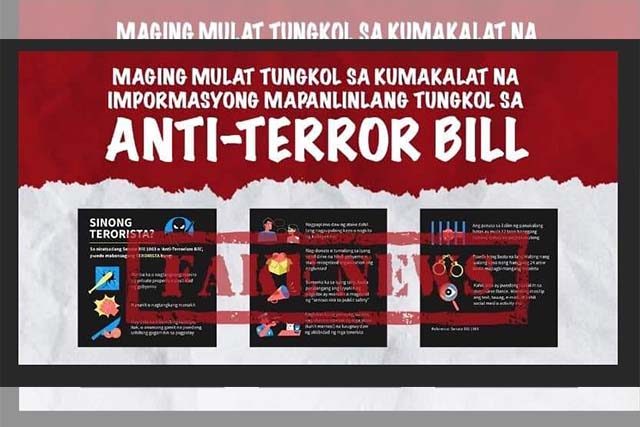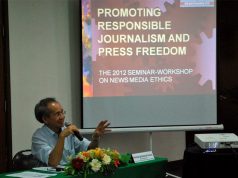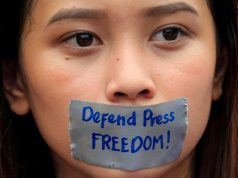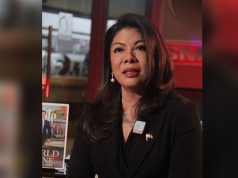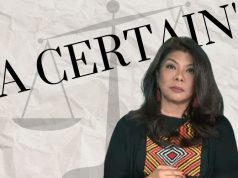A provincial police station deleted its post about anti-terrorism after learning it came from a progressive organization accused of being a legal front of the communist rebels.
The original post published on the Facebook page of Batac Police Station in Ilocos Norte last week showed its anti-terrorism campaign that features an infographic on terrorist and types of terrorism acts.
The infographic was called out online for its “vague” definition of acts of terrorism such as: donating or helping relief drives that are not government or state-recognized, participating in a rally that can cause a “serious risk to public safety” and posting, writing sharing and/or retweeting posts (even memes) related to terrorist activities.
the way they are so vaguely phrased so they can be shaped to fit whatever agenda they have 💩 https://t.co/vZcwLSl3Ne
— jose (@HoaZaye) January 24, 2021
However, this infographic was later on determined to be from the AlterMidya Network or People’s Alternative Media Network, a network of independent and progressive media outfits, institutions and individuals. It was created in March 2020 when the anti-terrorism bill, then Senate Bill 1083 is still being deliberated at the Senate.
Online criticisms on this prompted the local police to take down its post.
The provincial police then uploaded an edited version of the infographic on Sunday. This time, they cited AlterMidya for the infographic and issued an apology for the previous error.
“We apologize for the misleading information regarding the Anti-Terror Bill the other day as it was erroneously posted,” the provincial police said.
“Rest assured that this won’t happen again because our main objective is to protect everyone against misleading information. Thank you for your understanding,” it added.
In the new infographic, Batac Police referred to the anti-insurgency law as a “bill” despite being signed into law in July 2020. It also took effect in the same month.
RELATED: Public clamor to declare anti-terror law ‘unconstitutional’ launched after Duterte approves bill
The provincial police also warned the public against supposed misleading information on the counter-terrorism law.
“Maging mulat tungkol sa kumakalat na impormasyong mapanlinlang tungkol sa Anti-Terror Bill,” the new version read.
Before Batac Police deleted the post, GMA journalist Atom Araullo tweeted the infographic on Sunday.
Local PNP infographic defines the following as terrorism:
– attempting to cause damage to government property
– helping relief drives that aren’t “state recognized”
– participating in a rally that can cause “serious risk to public safety”
– posts related to “terrorist activities” pic.twitter.com/sWEReYTAO6— Atom Araullo (@atomaraullo) January 24, 2021
Adrian Puse, a multijournalist of AlterMidya, responded to Araullo’s tweet and noted that the infographic was taken from the progressive media outlet.
Puse also stated that the local police used the graphic without permission.
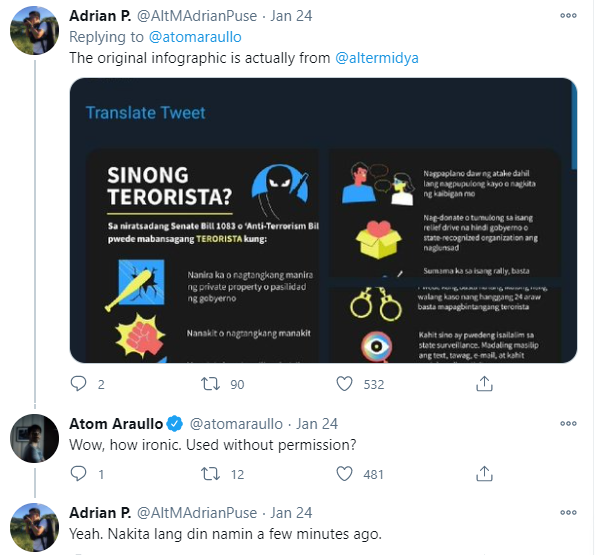
Araullo later added the corrections on his Twitter thread and attached the screenshots of Batac Police’s earlier post and the edited one.
Outdated infographic?
AlterMidya uploaded the infographic in question on March 5 last year.
Some activities mentioned there are still considered acts of terrorism under the provisions of the new measure.
“Sino ang pwedeng pagbintangang ‘terorista’ sa ilalim ng Anti-Terrorism Bill?” the caption wrote.
Sino ang pwedeng pagbintangang 'terorista' sa ilalim ng Anti-Terrorism Bill? pic.twitter.com/geSoawu7TV
— AlterMidya (@altermidya) March 5, 2020
Red-tagged AlterMidya
In December 2020, the National Task Force to End Local Communist Armed Conflict accused AlterMidya of being part of the propaganda movement of the Communist Party of the Philippines despite having no strong evidence to back up its allegations.
The alternative media denounced this as a form of a smear campaign against its members and a tactic to silence dissent.
“We can clearly see through these tactics of smearing and intimidating truth-tellers and critics into silence, especially in the middle of a growing discontent among the public,” AlterMidya said.
The National Union of Journalists of the Philippines and other similar organizations stood in solidarity with the alternative media’s work.
The anti-terror law was considered as the most controversial legislation passed after the Cybercrime Prevention Act in 2012.
More than 20 petitions from various legal, civic and concerned groups of Filipinos were filed before the Supreme Court that seek to declare its unconstitutionality.
The oral arguments for this will begin on February 2.

